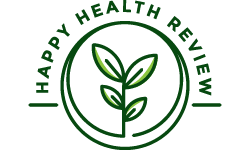The 11 Best Natural Supplements and Herbs for Depression

Depression is a mental health condition that affects more than 17 million Americans alone. However, the actual numbers are thought to be much higher than most people realize. Many people with depression don't seek treatment for various reasons.
There is still a lot of research into how nutritional supplement and herbal treatment work to treat depression. If you're suffering from depression, talk to your health care provider and explore any therapeutic interventions before using supplements.
It is important to keep in mind that there is no single cure-all for mental disorders and you will probably benefit the most from a combination of different types of support.
Depression is classified into five different categories, which share similar common symptoms including feelings of sadness, irritability, an empty feeling, and cognitive changes that impact functioning.
- Major Depressive Disorder (MDD)
- Disruptive mood dysregulation disorder (DMDD)
- Persistent depressive disorder (PDD)
- Premenstrual dysphoric disorder, or PMDD
- Depressive disorders due to another medical condition
Depression is a common psychological disorder that sometimes is also treated by dietary changes and supplement regimens. Here are 11 supplements and herbs that may help people with depression:
Rhodiola Rosea Supplement
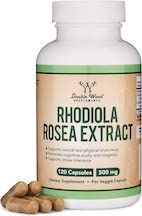
Rhodiola is an herbal supplement that has been linked to a variety of health benefits. These include reduced depression and improved stress response. They can help your body adapt better to stressful situations.
The herb may exert anti-depressant effects by enhancing nerve cell communication and reducing the body's stress response system. Supplementing with Rhodiola may help people who suffer from depression by affecting neurotransmitter receptors and molecular networks that may be beneficial for mood.
For example, a recent study of 57 people with major depression found that taking 340 mg of Rhodiola Rosea extract daily for 12 weeks resulted in clinically meaningful improvements in depressive symptoms. While Rhodiola Rosea treatment was less effective than an antidepressant medicine called Sertraline, Rhodiola Rosea caused far fewer side effects.
Another study found that taking a supplement composed of rhodiola and saffron significantly reduces depression and anxiety symptoms in adult patients with mild to moderate depression. Rhodiola may have some benefits for depression when taken alone or combined with safflower. However, more studies need to be done to draw solid conclusions.
Pure Saffron Extract
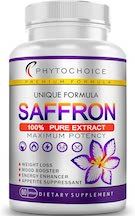
Saffron is an intensely colored spice that contains antioxidants, including the carotenes crocin and crocins. Saffron has shown promise as an effective natural treatment for depression.
It has been found that it increases serotonin levels in the brain. It’s not known exactly how this process works but it’s thought to inhibit serotonin reuptake, which keeps it in the brain longer.
A meta-analysis of five randomized controlled trials showed that taking saffron supplements significantly reduced depressive symptoms in adult patients with major depression compared with placebo treatments. Saffron supplements are just as effective at relieving depression as antidepressants.
However, the researchers acknowledge that larger trials with longer periods of follow-up are needed to better assess caffeine's ability to treat depression. Supplements made from saffron show promise as alternative treatments for depression.
Supplements for Depression
Nordic Naturals Omega-3

Omega-3 fats (also known as omega-3 fatty acids) are essential fats, meaning they must be obtained through the diet. Omega-3 supplements may help treat depression. A study published in 2020 analyzed randomized control trials involving 638 pregnant and postpartum mothers and found that omega-3 supplements significantly improved depressive symptoms.
Supplements with a high EPA/DHA ratio were particularly effective. Both EPA and DHA are types of omega-3 fats, both of which are found in seafood. A new review of 26 studies involving 2,160 participants found evidence that omega-3 supplements exert an overall positive effect on depression.
Researchers found that fish oil supplements containing at least 60 percent eicosapentaenoic acid (EPA) in a daily dose of 1 gram or smaller were most effective. While these findings are encouraging, other studies have observed less positive results. A 2019 study found that omega 3 supplements don't reduce depressive symptoms in children or adolescents with major depression.
Omega-3 supplements are a well-tolerated and healthy addition to a person's diet if they lack fatty fish. They may also be used to treat depression in some people. However, more research needs to be done. Omega-3 supplements could help treat depression in some people, but more research is required.
NAC (N-acetylcysteine): Life Extension Glutathione, Cysteine
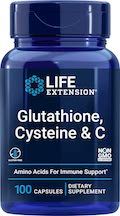
NAC is a precursor to the amino acids L‑cysteine and glutahtein. Glutathione, which is considered one of the best antioxidants in your body, is crucial for regulating inflammation and protecting your cells from oxidative damage.
Taking NAC has several health benefits, including increasing your body’s natural antioxidant levels. Research shows that people who suffer from depression tend to have higher levels of proinflammatory cytokines. Taking NAC may help reduce inflammation and ease depressive symptoms.
More importantly, NAC may improve neurotransmitter dysregulation in those who suffer from psychiatric disorders. The dysregulation of certain neurotransmitters like dopamine or glutamate may be associated with some mental illnesses, including depression and schizophrenia.
A 2016 review of five studies found that taking NAC was associated with significant reductions in depressive symptoms and improvements in functioning in people with depression. Plus, the N-acetyl cysteine supplements were safe and well-tolerated.
Doses of 2-2.4 grams per day are thought to help treat depression. NAC supplements may help reduce depressive symptoms and improve functioning for people with depression.
Source Naturals Vitamin D-3 Liquid Drops

Vitamin D is a crucial nutrient that plays numerous essential functions in your body. Many people don't have sufficient vitamin D levels. People with depression often suffer from vitamin D deficiency.
Research shows that people who suffer from depression are more likely to have low levels of vitamin D. People who have the condition tend to have low vitamin D levels compared to the general population, and those with the lowest levels tend to have the most significant depressive symptoms.
Vitamin D may help prevent depression by reducing inflammation, regulating moods, and protecting against neurodegenerative diseases. A 2019 review of three randomized controlled trials found that Vitamin D supplements lead to clinical benefits in people who suffer from major depression.
A recent study on people with depression showed that receiving a single injection containing 300,000 IU of Vitamin D along with their usual antidepressant treatment significantly improved depressive symptoms and quality of life.
However, a 2020 study found that although vitamin D levels were associated with depressive symptoms, there was not enough evidence to recommend vitamin D supplementation as a universal treatment for major depression.
Studies show that taking vitamin D supplements may be beneficial for people with depression. However, more research needs to be done before it can be prescribed for depression.
Vitamin B12 by Nature's Bounty

B vitamins play an important role in neurological function and mood control. B Vitamins, including Folate, B12, and Vitamin B6, is needed to produce and regulate neurotransmitters like Serotonin, GABA, and Dopamine.
According to research, deficiencies in vitamin B12 or folic acid may increase the risk of developing depression, and taking supplements may help reduce depressive symptoms for some people. For example, folic acid supplements may help treat depression in people who have a genetic mutation affecting their ability to metabolize folic acid.
Vitamin B12 supplementation has also been shown to help reduce depressive symptoms in people who suffer from major depression when used alongside antidepressant medication.
A recent review suggests that taking vitamin B12 before starting an antidepressant medication might help prevent depression from developing, and improve the effectiveness of antidepressants.
Vitamin B6 has been found to improve depressive feelings when used in combination with several other nutrients, including tryptophan and nicotinamide. Vitamin B deficiencies are linked to an increase in the risk of depression. Folate, vitamin B6, and vitamin B12 may help treat depression.
Nature's Bounty Zinc
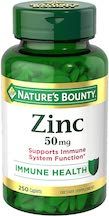
Zinc is a vital mineral for brain health and the regulation of neurotransmitter pathways. It has anti-oxidant and anti-inflammatory properties. Zinc deficiency is linked to an increased risk for depression and depression symptoms.
A study of 17 observational studies found people with depression had lower blood zinc levels than those who did not have depression. The study found that people who had lower levels of zinc were more likely to be depressed.
A review that included four randomized controlled studies found that when people taking antidepressants took zinc supplements alongside their medication, they experienced lower levels of depression.
Zinc is an important mineral for brain function. A zinc deficiency may increase the risk of developing depression. More importantly, supplementing with zinc could reduce depressive symptoms when used along with antidepressants.
SAM-e by Nature's Trove
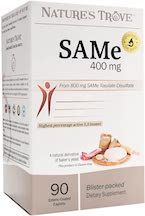
S-Adenosylmethionine (SAMe) is a sulfur-containing amino acid that is effective in the treatment of depression. It’s natural in your body and plays an important role in cognitive function.
Eight studies found that SAMe (S-adenosylmethionine) when used alone or with antidepressants prescription medications, improved depressive symptoms in patients with major depression. The daily doses ranged between 200–3,200mg, while the treatment times ranged from 2–12weeks.
Nature's Way St. John’s Wort
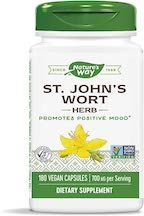
St John’s wort is a popular herb used for treating depression. A 2016 review of studies found that treatment with St John’s wort reduced symptoms in people who had mild to moderate depression. But the supplement hasn't been proven effective for treating serious depression.
Like many other herbs, St. John’s Wort has the potential to interfere with common medications. Importantly, the herbs can interact with certain antidepressants, leading to potentially life-threatening side effects.
BioEmblem Triple Magnesium Complex
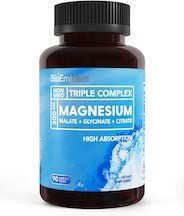
Magnesium is an essential mineral that may help those with depression. Magnesium deficiency is commonly seen among people with depression, which is reduced by supplementing with magnesium.
A randomized trial in 126 people with mild-to-moderate depression found that taking 248mg of magnesium daily for six weeks significantly improves depressive symptoms compared with a placebo.
Optimum Nutrition Micronized Creatine
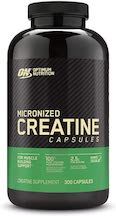
Creatine is an essential nutrient for the brain. It helps maintain brain energy and other functions. Alterations in brain energy levels are thought by some researchers to be involved in the onset of depression.
Supplementing with 2–10g of creatine per day may help alleviate some of the symptoms of depression.
While SAMe, Magnesium, John’s Worts, and creatine may help relieve depression. More research is needed. These supplements are safe, but they might still interact with other drugs you're taking. Before adding them to your diet, talk with your doctor.
Suicide Prevention
If you or someone close to you is thinking about suicide or self-harm and needs help, please seek support. Call the National Suicide Prevention Lifeline 24 hours a day at 800–273–8255.
Text “HOME" to the Crisis Text Line at 741741. Not in the US? Contact Befrienders Worldwide for a free helpline in your language.
If you think it’s an actual emergency, call 911 or your local emergency line. While you wait for rescue, stay with someone and take away any weapons or substances that could cause harm. You're not alone.
Final Thoughts
Depression is a mental illness that affects millions of people around the world. Depression is usually treated by medication and therapy, but some people may want to consider trying other safe methods like dietary changes or supplements to help reduce their symptoms.
Some supplements have been studied for their ability to reduce depressive symptoms and might be appropriate for some people who experience depression.
